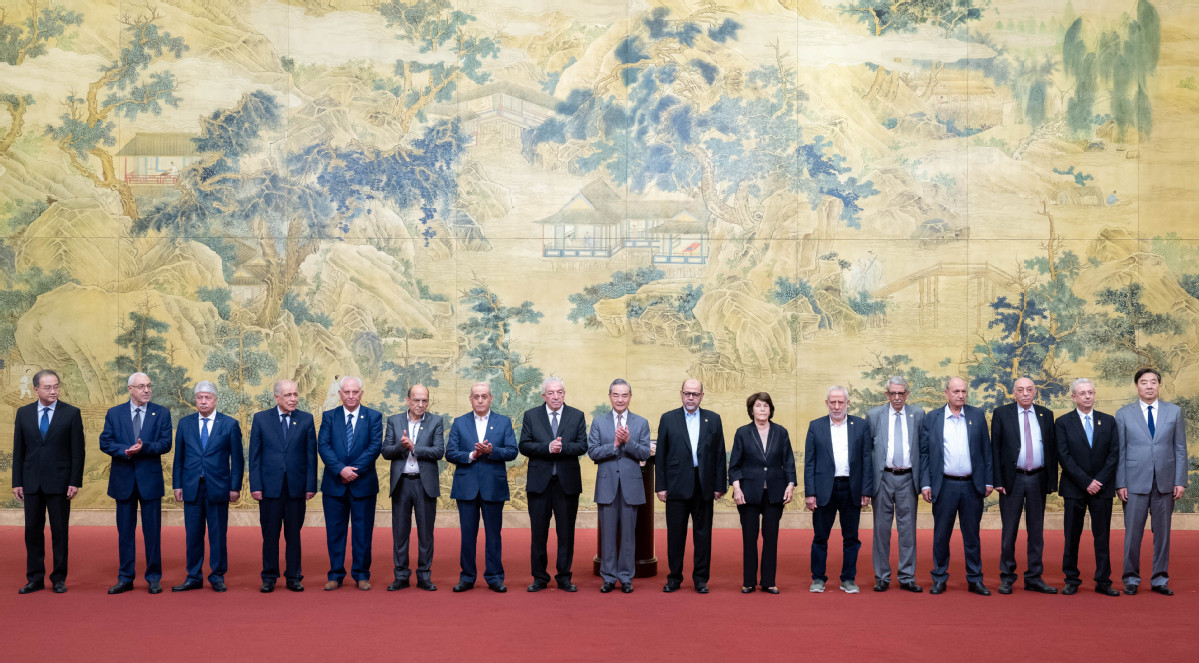Lasting efforts on mediation reap success
Peace: Nation ‘has followed global trend’
By ZHANG YUNBI | chinadaily.com.cn | Updated: 2024-07-28 23:38

China has made major moves over the past week aimed at brokering peace for two of the world's most prominent hot spot issues — the Ukraine crisis and the Palestinian-Israeli conflict.
In addition to the progress made on those matters, Beijing's envoys on different issues have continued traveling abroad over the weekend, holding talks to further facilitate peace and development.
Officials and scholars said that Beijing's lasting efforts are paying off, and that these practical actions serve to implement the China-proposed Global Security Initiative. They also help to shape an external environment for the country to move forward on the Chinese path to modernization.
Following China's success in enabling rapprochement between Saudi Arabia and Iran last year, Beijing hosted talks for internal reconciliation between Palestinian factions in the past week, and the factions' representatives signed the landmark Beijing declaration on Tuesday for ending division and strengthening the national unity of Palestine.
Leaders including United Nations Secretary-General Antonio Guterres welcomed the signing of the Beijing declaration. Guterres urged the factions "to follow up on the commitments that were made in Beijing and the declaration they signed on to", said Stephane Dujarric, the UN chief's spokesman.
Kabir Taneja, a fellow with the Strategic Studies Programme at the Observer Research Foundation, a think tank in India, said: "For Beijing, hosting these Palestinian groups is not a first. The previous meeting between Fatah and Hamas hosted by the Chinese government took place only recently, in April."
The engagement demonstrates China's wish to be a major country that is "noninterventionist, and stands for peace and reconciliation", Taneja wrote in a recent article.
Maged Refaat Aboulmagd, an ambassador member of the Egyptian Council for Foreign Affairs, said the fact that China has brought Palestinian factions together shows great "courage and wisdom" on the part of Beijing.
"This is the kind of soft power that China needs to export to the world and exercise more and more, and we would love to have China more active also in these fields and beyond," he said.
In addition, Foreign Minister Wang Yi met with Ukrainian Foreign Minister Dmytro Kuleba in Guangzhou, Guangdong province, on Wednesday. "China's role as a global force for peace is important," Kuleba said.
Furthermore, starting on Sunday, Li Hui, special representative of the Chinese government on Eurasian affairs, will visit Brazil, South Africa and Indonesia to carry out the fourth round of shuttle diplomacy on the Ukraine crisis.
"We are committed to pursuing common, comprehensive, cooperative and sustainable security, and to resolving disputes and differences through dialogue and consultation and enhancing security through cooperation," Foreign Ministry spokeswoman Mao Ning said on Friday.
Observers said that Beijing's quest for peace is not a passing fancy or an empty slogan, but is based on decades of persistent, long-term engagements.
Niu Xinchun, executive director of the China-Arab Research Institute at Ningxia University, said that behind many nations' approval of Beijing's mediation efforts is the fact that "China has followed the global trend, and China has responded proactively to the call of the international community".
Wang Yiwei, a professor at Renmin University of China's School of International Studies and director of the university's Institute of International Affairs, said that China's commitment to promoting peace and talks and to mediation diplomacy is "sincere, all-encompassing and long-lasting".
"From Afghanistan and Africa to the South Pacific, we have Chinese envoys who have been traveling and shuttling for mediation, or for local development," he said.
"China's efforts in bolstering global security are holistic, taking care of many areas such as climate security, infrastructure security and digital security," he added.
The past week's successes and progress in mediation followed the conclusion of the third plenary session of the 20th Central Committee of the Communist Party of China earlier this month.
The plenary session stated that China must "remain firm in pursuing an independent foreign policy of peace", be dedicated to promoting a community with a shared future for mankind, put into practice the common values of all mankind, and implement the Global Development Initiative, Global Security Initiative and Global Civilization Initiative proposed by President Xi Jinping.
As part of Beijing's actions to further realize these visions, Foreign Minister Wang Yi was in the Laotian capital, Vientiane, from Thursday to Saturday to attend a series of meetings of the foreign ministers of Southeast and East Asian countries.
On the sidelines, he met in bilateral settings with high-ranking diplomats, including those from the United States and the European Union. During these talks, nations and regional groupings vowed their willingness to work more closely with China to advance peace.
David Borrelli, high representative for foreign affairs and security policy of the European Union, said the EU attaches importance to the peace proposal put forward by China and Brazil in May for the political settlement of the Ukraine crisis.
zhangyunbi@chinadaily.com.cn























